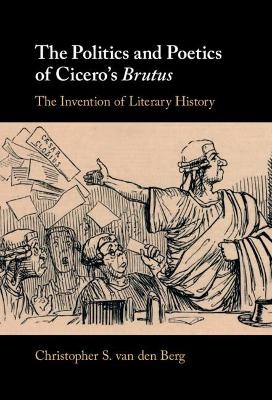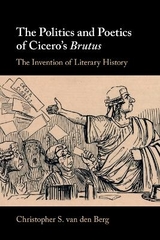
The Politics and Poetics of Cicero's Brutus
The Invention of Literary History
Seiten
2021
Cambridge University Press (Verlag)
978-1-108-49595-0 (ISBN)
Cambridge University Press (Verlag)
978-1-108-49595-0 (ISBN)
- Titel erscheint in neuer Auflage
- Artikel merken
Zu diesem Artikel existiert eine Nachauflage
Cicero's Brutus (46 BCE), a magisterial dialogue on Rome's oratorical and political history, was written amidst Julius Caesar's rise to power. This book examines how Cicero, in responding to the civic crisis and contemporary intellectual developments, ultimately created the first complex account of literary history in the European tradition.
Cicero's Brutus (46 BCE), a tour-de-force of intellectual and political history, was written amidst political crisis: Caesar's defeat of the republican resistance at the battle of Thapsus. This magisterial example of the dialogue genre capaciously documents the intellectual vibrancy of the Roman Republic and its Greco-Roman traditions. This book is the first study of the work from several distinct yet interrelated perspectives: Cicero's account of oratorical history, the confrontation with Caesar, and the exploration of what it means to write a history of an artistic practice. Close readings of this dialogue-including its apparent contradictions and tendentious fabrications-reveal a crucial and crucially productive moment in Greco-Roman thought. Cicero, this book argues, created the first nuanced, sophisticated, and ultimately 'modern' literary history, crafting both a compelling justification of Rome's oratorical traditions and also laying a foundation for literary historiography that abides to this day.
Cicero's Brutus (46 BCE), a tour-de-force of intellectual and political history, was written amidst political crisis: Caesar's defeat of the republican resistance at the battle of Thapsus. This magisterial example of the dialogue genre capaciously documents the intellectual vibrancy of the Roman Republic and its Greco-Roman traditions. This book is the first study of the work from several distinct yet interrelated perspectives: Cicero's account of oratorical history, the confrontation with Caesar, and the exploration of what it means to write a history of an artistic practice. Close readings of this dialogue-including its apparent contradictions and tendentious fabrications-reveal a crucial and crucially productive moment in Greco-Roman thought. Cicero, this book argues, created the first nuanced, sophisticated, and ultimately 'modern' literary history, crafting both a compelling justification of Rome's oratorical traditions and also laying a foundation for literary historiography that abides to this day.
CHRISTOPHER S. VAN DEN BERG is Professor of Classics at Amherst College. He is the author of The World of Tacitus' Dialogus de Oratoribus (Cambridge, 2014) and has published and researched broadly in ancient and modern political rhetoric.
Introduction; 1. Ciceropaideia; 2. The intellectual genealogy of the Brutus; 3. Caesar and the political crisis; 4. Truthmaking and the past; 5. Beginning (and) literary history; 6. Perfecting literary history; 7. Cicero's Attici; 8. Minerva, Venus, and Cicero's judgments on Caesar's style; Conclusion.
| Erscheinungsdatum | 06.09.2021 |
|---|---|
| Zusatzinfo | Worked examples or Exercises |
| Verlagsort | Cambridge |
| Sprache | englisch |
| Maße | 159 x 235 mm |
| Gewicht | 590 g |
| Themenwelt | Geschichte ► Allgemeine Geschichte ► Vor- und Frühgeschichte |
| Geschichte ► Allgemeine Geschichte ► Altertum / Antike | |
| ISBN-10 | 1-108-49595-8 / 1108495958 |
| ISBN-13 | 978-1-108-49595-0 / 9781108495950 |
| Zustand | Neuware |
| Informationen gemäß Produktsicherheitsverordnung (GPSR) | |
| Haben Sie eine Frage zum Produkt? |
Mehr entdecken
aus dem Bereich
aus dem Bereich
Was Pompeji über uns erzählt
Buch | Hardcover (2023)
Propyläen (Verlag)
32,00 €
auf den Spuren der frühen Zivilisationen
Buch | Hardcover (2023)
C.H.Beck (Verlag)
20,00 €



